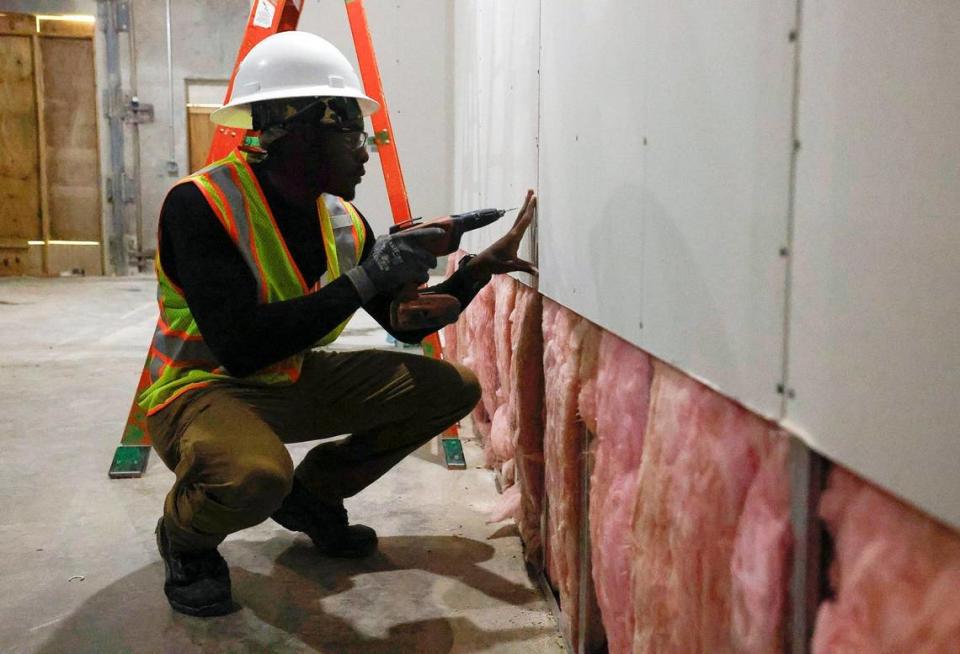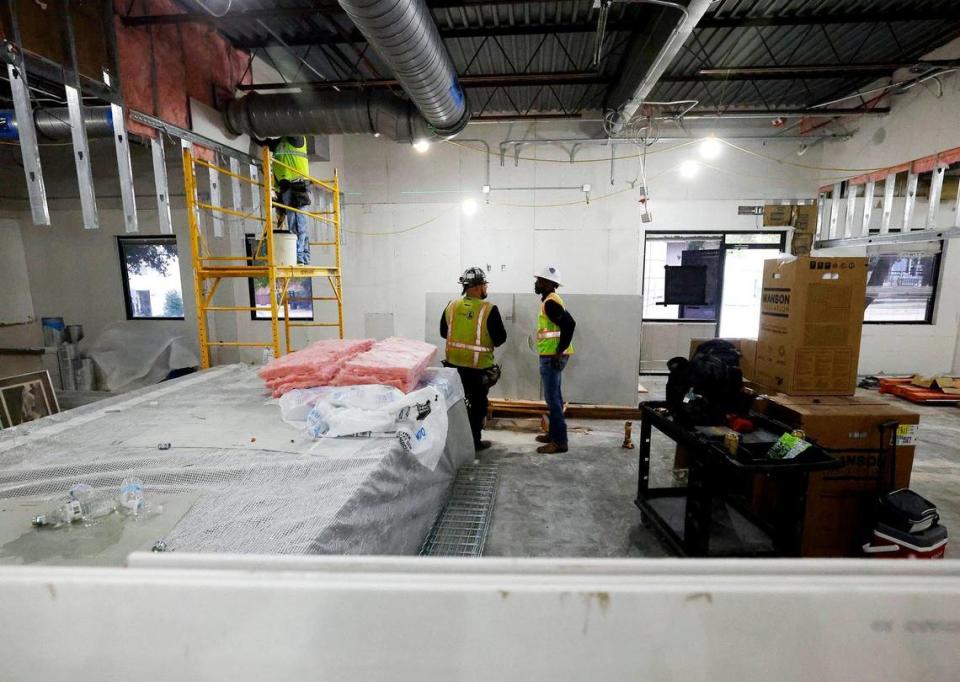Fort Worth wanted more contracts with minority-, women-owned businesses. How has it done?
Jeff Postel is the founder of Post L Group, a Black-owned construction management company that he founded eight years ago.
Postel describes construction as a risky industry where people need lines of credit, connections, and, most importantly, access to opportunities to expand their experience. He got help with those things through his relationship with the Fort Worth Metropolitan Black Chamber of Commerce, where he attended classes on construction and built relationships with leaders in Fort Worth and Tarrant County.
When he looks at the landscape of Black-owned construction companies, he thinks a lack of trade experience within the Black community is why it’s hard for many to get a foothold in the market.
“You don’t have a lot of Black trade contractors with work because either we’re not prepared to work, we’re not experienced at the work, and some of us are scared to work, especially in a bigger space,” Postel said. “Like we’re scared to kind of grow capacity because folks are scared to fail.”
In the last few years, the city of Fort Worth has worked to improve its relationships with minority- and women-owned business enterprises (MWBE) to help them thrive and compete with others in the market. Recently, the city’s Business Equity Division, run by the Diversity and Inclusion Department, presented its informal report on the city’s Business Equity Program to the city council. The program is designed to close racial and gender gaps in city contracting and procurement and to assist business equity firms in gaining access to prime contracting and sub-contracting opportunities.
The city considers its marketplace to include Fort Worth; Tarrant, Dallas, and Johnson counties; and portions of Parker, Wise and Denton counties. Of the businesses in the categories of construction, goods and services, and professional services in that area, 6.6 percent are Black owned, 9.2 percent are Hispanic owned, and 6.9 percent are owned by white women.
Contracts for minority-owned businesses on the rise
The report showed an upward trend of contracts awarded by the city to minority- and women-owned businesses from the 2018-2019 fiscal year to the 2022-2023 fiscal year. In a four-year span from 2018 to 2022, contracts to African American-owned businesses went from below 1.0 percent to 5.9 percent, contracts to Hispanic-owned businesses went from 6.7 percent to 8.9 percent, and contracts to businesses owned by white women went from below 1.0 percent to 3.78 percent. Contracts to Black-owned businesses dipped to 1.2 percent of total awards in fiscal year 2022-2023, while contracts to Hispanic- and women-owned businesses continued to grow, to 9.84 percent and 3.84 percent respectively.
The Business Equity Division measures these numbers by the percent of minority- and women-owned businesses and the overall dollar value of contracts awarded.
Gwen Wilson, assistant diversity and inclusion director, says her department’s mission is to ensure that minority-owned businesses can overcome obstacles and have a chance at city contracts.
The Diversity and Inclusion Department makes sure contract language is inclusive, monitors the planning process, and helps build up businesses to contribute to the economy.
“People are not asking for something they don’t deserve,” Wilson said. “As an entrepreneur, you put everything you got into your business to be successful. I mean, nobody goes into business to be broke. Everybody goes into business to be profitable to make a profit, and if the doors are closed to you, then that’s not equity, that’s not fairness.”

Study showed help needed to ensure fair access
In 2020, the city hired Colette Holt & Associates to perform a business equity firm disparity study to assess how minority- and women-owned businesses have participated in city contracts.
The study and anecdotal evidence showed race and gender initiatives were needed to ensure full and fair access by all firms to city contracting and subcontracting opportunities. Thus, the city adopted a Business Equity Ordinance, which was amended in November 2020 and took effect in January 2021.
The ordinance states that all city funded projects valued at $100,000 and above are to be reviewed by the Business Equity Division for a determination on setting a goal related to minority- and women-owned businesses.
Minority- and women-owned businesses must be certified by an agency approved by the Business Equity Division.
“I think it’s important to remember also that subcontractors or MWBE firms are just as qualified as any other firm,” Sky Williams, the city’s diversity and inclusion manager, said. “They have passed their certifications, and they are bringing as much to the table as any other firm.”
To help with its inclusion goals, the city expanded its outreach efforts with Tarrant County agencies and outside entities focusing on minority- and women-owned business capacity building and development. Efforts include partnering with The Beck School of Construction to provide training to certified minority-owned businesses in which participants increase their knowledge of the construction industry and get help to be competitive bidders on city projects. The Diversity and Inclusion Department has also attended over 100 community events within the past two years, including the annual Tarrant County Business Opportunity Fair held at the Will Rogers Memorial Center.

Desire for all groups to be part of city’s growth
Anette Landeros, president and CEO of the Fort Worth Hispanic Chamber of Commerce, said there are a tremendous amount of new economic opportunities as Fort Worth grows. She wants all communities to be able to thrive.
“Historically each community has their own story, whether the story of enslavement or a story of immigration,” Landeros said. “Essentially, we’re acknowledging that they were not at the table initially when opportunities were first available. And so how do we ensure that we add chairs to the table and make sure that all groups are able to be a part of the growth of our city?”
Michelle Green-Ford, president and CEO of the Fort Worth Metropolitan Black Chamber of Commerce, said her organization helps reduce minority business owners’ fears by providing examples of previous success stories, instruction on how to get certification, interpretation of the language or the terms of contracts and help in registering with the city.
“We literally make it very plain and very clear and help in that process so the individual can focus on their ability to provide services and their ability to provide value,” Green-Ford said. “Because at the end of the day, we really want value for the city and value for the minority vendors, and we want to see that value in our community to where it helps us grow a healthy city.”
Postel, the founder of Post L Group, says he wants the city to increase its efforts so other Black contractors and business owners can grow like his company.
“Thank God we’ve been able to keep after it and keep pushing forward and growing our capacity,” Postel said, “But I’ll just tell you that companies that are of color that want to get bigger need to have that opportunity to get bigger.”

